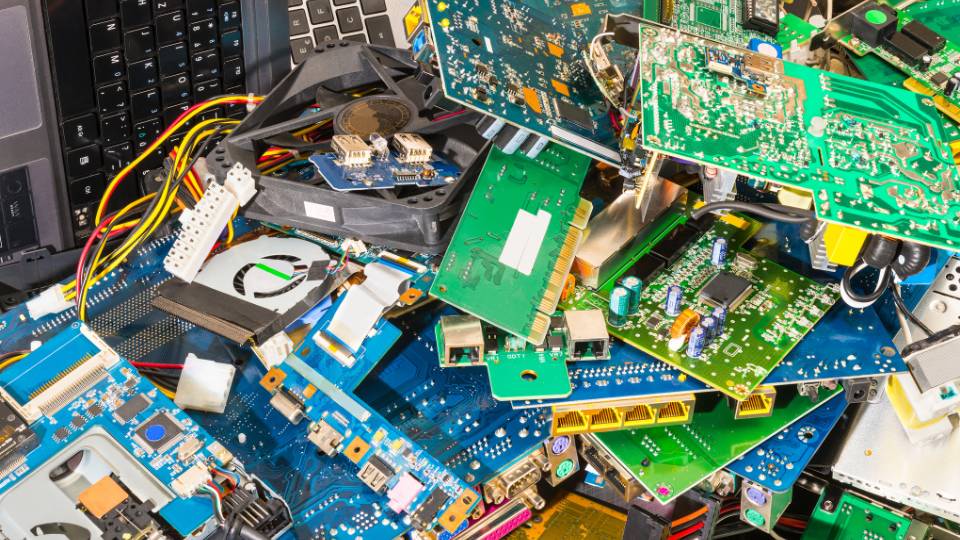
Electronic waste, or e-waste, has become a pressing environmental concern in the United Kingdom.
As technology advances at an unprecedented rate, the disposal of electronic devices has reached alarming levels.
This blog post aims to shed light on the magnitude of the e-waste problem in the UK by presenting 20 facts and statistics that highlight the urgency of addressing this issue. Read on to discover E-waste facts for the United Kingdom.
E-Waste Facts and Statistics for the United Kingdom
- The United Kingdom generates over 1.6 million tonnes of electronic waste each year. This staggering amount places e-waste as one of the fastest-growing waste streams in the country.
- The average UK household owns approximately 25 electronic devices, illustrating the widespread reliance on technology and the subsequent accumulation of outdated or broken gadgets.
- Shockingly, around 20% of electronic devices in the UK are hoarded or stored in households, contributing to the mounting e-waste challenge. Proper disposal and recycling of these devices are essential to mitigate the environmental impact.
- Surprisingly, only about 20% of the UK’s e-waste is currently recycled through proper channels, indicating a significant gap in responsible disposal practices.
- In 2019, the UK recycled 479,000 tonnes of e-waste, representing a recycling rate of 38.1%. While this is an improvement, there is still a long way to go to achieve sustainable management of e-waste.
- Alarmingly, it is estimated that around 500,000 tonnes of e-waste from the UK is illegally exported each year. This illegal exportation exacerbates the global e-waste problem and contributes to environmental and health risks in other regions.
- To regulate the management and disposal of e-waste, the UK has implemented the Waste Electrical and Electronic Equipment (WEEE) Directive. This directive aims to ensure that 85% of electronic waste is recycled and recovered within the country.
- The UK government has set a target to achieve zero e-waste to landfill by 2030. This ambitious goal emphasises the importance of reducing the environmental impact of technology waste and promoting responsible recycling practices.
- Mobile phones and laptops are among the most frequently replaced electronic devices in the UK, leading to a significant influx electrical.
- In 2020 alone, the UK generated approximately 24.9 million discarded mobile phones, highlighting the sheer scale of electronic waste resulting from the turnover of these devices.
- It is crucial to recognise that e-waste contains valuable materials. In the UK, an estimated £14 billion worth of valuable metals are discarded each year, emphasising the economic significance of responsible technology waste recycling.
- The recycling of one million mobile phones can recover approximately 16 tonnes of copper, 350 kilograms of silver, 34 kilograms of gold, and 15 kilograms of palladium. This demonstrates the potential to reclaim valuable resources through proper technology recycling.
- Apart from the economic benefits, the fact that recycling e-waste also has significant environmental advantages should be a persuasive argument. In the UK, the recycling of technology reduces greenhouse gas emissions by an estimated 1.5 million tonnes of CO2 equivalent annually.
- London produces the highest amount of e-waste among cities in the UK, reflecting the concentration of electronic devices and technological infrastructure.
- E-waste facts on job opportunities. Recycling not only helps preserve the environment but also creates job opportunities. The recycling and refurbishment sectors in the UK benefit from the growing demand for proper technology waste management.
- Recognising the fact of urgency of addressing e-waste, the UK government offers financial incentives to businesses and organisations that recycle their electronic rubbish responsibly. This encourages responsible disposal practices and supports a sustainable circular economy.
- Many local authorities in the UK provide technology waste collection services and designated drop-off points for residents. These initiatives aim to facilitate convenient and responsible disposal of electronic devices.
- The UK hosts several e-waste recycling facilities that specialise in the safe and environmentally friendly processing of electronic waste. These facilities play a crucial role in recycling valuable materials and reducing the environmental impact of computer waste.
- Public awareness and education are vital in tackling the technology disposal challenge. By promoting responsible consumption, reuse, and recycling practices, individuals can actively contribute to reducing electrical rubbish generation in the UK.
- Collaboration between government, businesses, consumers, and recycling facilities is key to addressing the electronic rubbish crisis comprehensively. By working together, we can establish sustainable systems for the proper management and recycling of electronic refuse.
Action required for E-waste reduction
The mounting volume of e-waste in the United Kingdom demands immediate attention and action.
The facts and statistics presented underscore the need for responsible disposal, recycling, and the adoption of sustainable practices to combat the environmental and health hazards associated with e-waste.
By promoting awareness, implementing proper recycling infrastructure, and encouraging responsible consumption, we can work towards a future where e-waste is minimised, valuable resources are recovered, and our environment is safeguarded for generations to come.








